
Kraftwerk are a German electronic band formed in Düsseldorf in 1970 by Ralf Hütter and Florian Schneider. Widely considered innovators and pioneers of electronic music, Kraftwerk were among the first successful acts to popularize the genre. The group began as part of West Germany's experimental krautrock scene in the early 1970s before fully embracing electronic instrumentation, including synthesizers, drum machines, and vocoders. Wolfgang Flür joined the band in 1973 and Karl Bartos in 1975, expanding the band to a quartet. Since the band's formation, it has seen numerous lineup changes, with Hütter as its only constant member.

Air is a French music duo from Versailles, consisting of Nicolas Godin and Jean-Benoît Dunckel. Their critically acclaimed debut album, Moon Safari, including the track "Sexy Boy", was an international success in 1998. Its follow-up, The Virgin Suicides, was the score to Sofia Coppola's first movie of the same name. The band has since released the albums 10 000 Hz Legend, Talkie Walkie, Pocket Symphony, Love 2, Le voyage dans la lune and Music for Museum. The band is influenced by a wide variety of musical styles and artists.

Rock in Opposition or RIO was a movement representing a collective of progressive bands in the late 1970s united in their opposition to the music industry that refused to recognise their music. It was initiated by English avant-rock group Henry Cow in March 1978 when they invited four mainland European groups to come to London and perform in a festival called "Rock in Opposition".

The highly diverse and distinctive music of Madagascar has been shaped by the musical traditions of Southeast Asia, Africa, Oceania, Arabia, England, France and the United States over time as indigenous people, immigrants, and colonists have made the island their home. Traditional instruments reflect these widespread origins: the mandoliny and kabosy owe their existence to the introduction of the guitar by early Arab or European seafarers, the ubiquitous djembe originated in mainland Africa and the valiha—the bamboo tube zither considered the national instrument of Madagascar—directly evolved from an earlier form of zither carried with the first Austronesian settlers on their outrigger canoes.
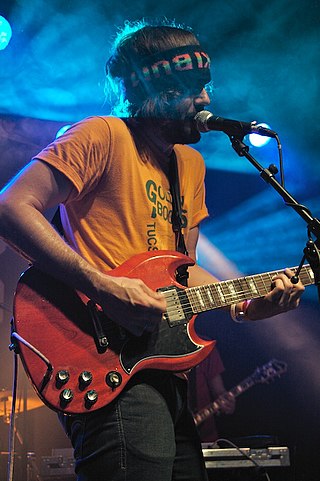
Malajube is a Canadian francophone indie rock band formed in Montreal, Quebec.
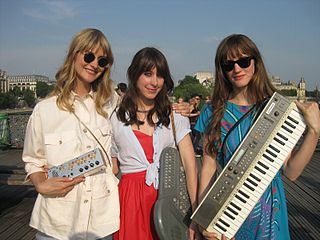
Au Revoir Simone is an American indie pop band from Williamsburg, Brooklyn, New York, formed in 2003. The group is composed of Erika Forster (vocals/keyboard), Annie Hart (vocals/keyboard/bass) and Heather D'Angelo.

Eusèbe Jaojoby, commonly known by his surname Jaojoby, is a Malagasy composer and singer of salegy, a musical style of northwestern Madagascar. Critics consider him to be one of the originators of the modern salegy style that emerged in the 1970s, and credit him with transforming the genre from an obscure regional musical tradition into one of national and international popularity. Jaojoby also contributed to the creation of two salegy subgenres, malessa and baoenjy. Jaojoby has been called the most popular singer in Madagascar and the Indian Ocean islands, and is widely referred to as the "King of Salegy". His success has earned him such honors as Artist of the Year in Madagascar for two consecutive years (1998–1999) and the role of Goodwill Ambassador for the United Nations Population Fund in 1999.
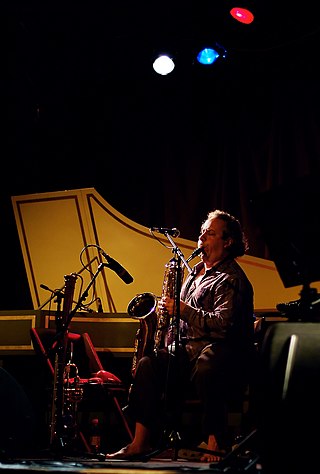
Jean Derome is a French Canadian avant-garde saxophonist, flautist, and composer. A prominent figure in the Montreal musique actuelle scene, Derome has been a member of experimental, jazz, and rock groups, and has appeared on over 30 albums, including seven solo albums. He has written scores for over 30 films and co-founded Ambiances Magnétiques, a Canadian musical collective and independent record label.

Bounding Main is an American a cappella quintet focusing on traditional sea shanties and maritime music.

The culture of Madagascar reflects the origins of the Malagasy people in Southeast Asia, East Africa and Oceania. The influence of Arabs, Indians, British, French and Chinese settlers is also evident.
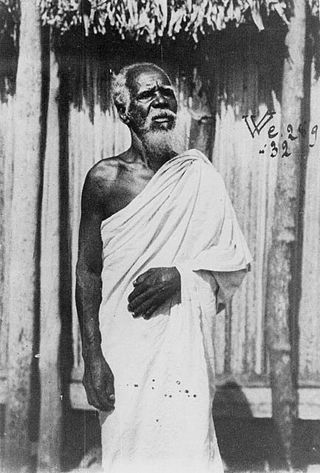
The Antambahoaka are the least numerous ethnic group in Madagascar, numbering around 50,000 in 2013. They inhabit a small region along the southeastern coast of Madagascar near Mananjary and share their origins with the partially Arab Antaimoro people, from whom the group split in the 15th century under a leader named Ravalarivo. Very little is known about the history of this group after its founding. The Antambahoaka speak a dialect of the Malagasy language, which is a branch of the Malayo-Polynesian language group derived from the Barito languages, spoken in southern Borneo.

Sabine Quindou is a French journalist and presenter. Quindou is known for co-hosting the popular science TV show, C'est pas sorcier with Jamy Gourmaud and Frédéric Courant, produced by France 3. She presented 188 episodes of C'est pas sorcier from 1999 to 2013.

Philibert Rabezoza, better known by the name Rakoto Frah, was a flautist and composer of traditional music of the central highlands of Madagascar. Born in 1923 near the capital city of Antananarivo to a poor rural family, Rakoto Frah surmounted the challenges posed by his underprivileged origins to become the most acclaimed 20th century performer of the sodina flute, one of the oldest traditional instruments on the island. Through frequent international concerts and music festival performances, he promoted the music of the highlands of Madagascar and became one of the most famous Malagasy artists, both within Madagascar and on the world music scene.
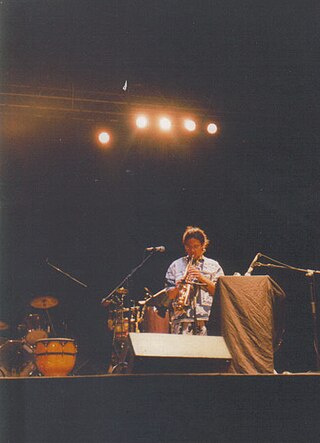
Nicolas Vatomanga Andrianaivo Rakotovao, known as Nicolas Vatomanga is a Malagasy saxophonist, flutist, bandleader and composer. His music combines elements of jazz, blues and traditional musics of Madagascar, including: the hira gasy of the Centre, the beko from the South and the salegy from the North of the Great Island.

Paul Bert Rahasimanana, better known as Rossy, is a Malagasy singer and songwriter, generally considered the most popular Malagasy artist of the 1990s. Beginning his musical career as an accordionist and singer within a traditional hira gasy musical troupe, Rossy innovated a fusion of hira gasy instrumentation and vocal style with contemporary rock, funk and folk sounds to create a uniquely Malagasy genre of contemporary popular music. Rossy actively promoted former president Didier Ratsiraka through concert performances throughout his presidency and served within the Ministry of Culture to promote artists' rights and copyright law. When Ratsiraka fell into disfavor following the contentious 2001 Malagasy presidential elections, Rossy went into self-imposed exile in France. He returned to the island to give concerts beginning in 2008 and enjoyed enormous popularity despite six years of absence, setting an unbroken record of 35,000 tickets sold for a performance given that year. His compositions and style are frequently associated with the Ratsiraka socialist period and commonly evoke a sense of nostalgia among Malagasy fans.

Samoëla Rasolofoniaina, better known as Samoëla, is a Malagasy vocalist and composer of contemporary folk fusion and roots music that draws upon musical traditions throughout the island of Madagascar. He typically sings and plays acoustic guitar, accompanied by an ensemble including bass guitar, Western and traditional percussion, and backup singers. He is distinguished by his use of hainteny traditional poetry and its metaphorical language, as well as youth slang and culturally subversive direct language to critique and address sensitive social and political topics.

Mahaleo is a folk-pop band from Madagascar that is widely viewed as the most popular Malagasy group of all time. The band was founded by Dama with six of his classmates after first performing together during the rotaka student protests at their high school on 13 May 1972. Mahaleo's lyrics draw upon the indirect language of traditional hainteny and ohabolana to expose contemporary political and social issues and invite listeners to identify their own solutions.
Tsiliva, born Christophe Tsiliva Diddiot, is a Malagasy musician who performs kilalaka, a traditional genre of music from the southwestern interior of Madagascar. The son of a pastor, he was born on 25 July 1982 and raised in the western coastal town of Ambovombe Androy, near Morondava. As a child he enjoyed playing music and composing songs. Upon reaching secondary school, he formed or joined many local groups, including Cabalero Music, Tsirangoty, Diddiot Pro, Calypso, Mentalis Music and Fouad music, with whom he both performed and composed music. After graduating high school and earning his baccalaureat in management and communications, he played bass for the group Dadah de Fort Dauphin, later joining the groups Terana and Terakaly as a percussionist. With Terakaly, he performed for the first time at a major music festival, the Donia music festival at Nosy Be.
Salala is an a capella vocal trio from the south of Madagascar. They perform a contemporary form of the traditional beko genre, which originates from the island's southern interior. In contrast to the traditional beko, a spiritual chant sung at funerals to honor the life of the deceased, Salala adapted the harmonies and style of the genre while shedding the religious purpose of the music by focusing the subject of their songs on matters of daily life. The group was founded by one of the singers, M'Bassa, in 1983, with singer Senge and a friend. All three performers belong to the southern Antandroy ethnic group and originate from a small village near Taolagnaro. Over the next ten years, the group gained in popularity in Madagascar, eventually winning the "Gasitsara Media Prize" for Best Band of the Year. Their first major domestic hit was "Salakao Raho Ene". The group went on to perform the Africolor music festival in 1994, where they were well received. In 1995 they recorded their first album, Salala, and were selected to represent the Indian Ocean states at the "Découvertes du Printemps de Bourges" tour, performing at 25 venues across France and Germany with Oumou Sangaré. After this success, the group's bass vocalist, Senge, launched a solo career, eventually teaming up with two other singers to lead his own trio, while still performing and recording with Salala. The band toured Africa in 1996, visiting the Seychelles, Uganda, Kenya, Rwanda, Malawi, Zambia, Namibia and South Africa. They performed at the third Jeux de la Francophonie in Madagascar in 1997 and toured Singapore in 1998. In 1999, Salala toured Reunion island with Granmoun Lélé.
Hazolahy is a musical group from Madagascar that performs the traditional genre of mangaliba from the island's southeastern coast. The group's music occasionally integrates the vocal style of beko from the neighboring Antandroy region at the southern end of Madagascar. The founder of the group, Thominot Hazolahy, grew up among musicians and while still a student formed his first group, which performed a fusion of blues, mangaliba and reggae. His second group, Hazolahy, stays truer to the mangaliba genre. Hazolahy's music combines vocals, acoustic guitars and percussion, including large traditional drum of ritual significance which is itself called hazolahy. Founding member R. Benny left the group in 2004 to launch the band Rabaza.

















